There are serious violations
Presenting the monitoring report, Chairwoman of the Social Committee, Deputy Head of the National Assembly's Monitoring Delegation Nguyen Thuy Anh said that, in order to achieve the "dual" goal of both preventing and fighting the epidemic and developing the economy , ensuring people's lives, the National Assembly issued Resolution No. 30/2021/QH15 (Resolution No. 30), which stipulates a number of specific mechanisms and policies to serve the work of preventing and fighting the epidemic.
In addition to the results achieved, the monitoring team also pointed out shortcomings and limitations in the mobilization, management and use of resources for the prevention and control of the Covid-19 epidemic. There were serious violations in research, acceptance, transfer, circulation licensing, price negotiation, production organization, purchase and sale of Covid-19 test kits related to Viet A Technology Joint Stock Company; organizing flights to bring Vietnamese citizens from abroad back to the country for quarantine at civil facilities, voluntarily paying fees during the Covid-19 epidemic. Many officials at the central and local levels were prosecuted.
The monitoring delegation recommended that the National Assembly issue a monitoring resolution, requiring urgent review, synthesis, and classification to handle backlogs and problems in the management and use of resources for Covid-19 prevention and control.
Mobilizing and allocating resources for epidemic prevention (as of December 31, 2022)
Resources mobilized
- The total amount of money mobilized is about 230,000 billion VND, of which:
+State budget over 186,400 billion VND
+ Funding and aid sources of about 43,600 billion VND
- Over 11,600 billion VND contributed to the Covid-19 Vaccine Fund
Funds used
Support for people and businesses over 87,000 billion VND
Implementing policies and regimes for frontline forces and other forces participating in the fight against the epidemic is about 4,487 billion VND.
Buying Covid-19 vaccine is about 15,134 billion VND
Purchase of test kits about 2,593 billion VND
Purchase of medical equipment, supplies, drugs and biological products is 5,291 billion VND
Expenditure for examination, emergency care, and treatment of Covid-19 patients is 719 billion VND...
The pain of "winning the epidemic, losing people"
Discussing this content, delegate Nguyen Lan Hieu (Binh Dinh) said that we have witnessed an entire system participating with more than 100% of its strength, but after the epidemic, many unfortunate things still happened, lessons learned in blood. Delegate Nguyen Lan Hieu agreed with the proposal of the monitoring delegation that the Ministry of Health should soon issue documents guiding the use of medical supplies and equipment that have been prepared to fight the epidemic, switch to regular medical examination and treatment; and assign local hospitals to decide on their use to avoid wasting facilities and equipment that have been purchased and donated.
Deputy Nguyen Anh Tri (Hanoi) agreed with the view that embezzlement and corruption in epidemic prevention and control activities must be dealt with severely; however, it is also necessary to consider violations reasonably, emotionally, and fairly, not for personal gain but for timely epidemic prevention and control, for the benefit of the community.
Deputy Pham Khanh Phong Lan (HCMC) acknowledged that the "winning the epidemic, changing the general", the entire health system, and the number of officials who have to pay the price for this pandemic is too great. The Deputy believes that it is necessary to handle the current problem to ensure the future.
Don't let primary health care "shrink"
Regarding preventive medicine, the National Assembly's monitoring report clearly shows that when faced with large-scale medical emergencies such as the Covid-19 pandemic, the grassroots health care and preventive health systems in many places have revealed shortcomings and weaknesses. Many localities reported a shortage of human resources in grassroots health care, including large cities such as Hanoi, Da Nang, and Ho Chi Minh City. This situation mainly occurs at commune health stations.
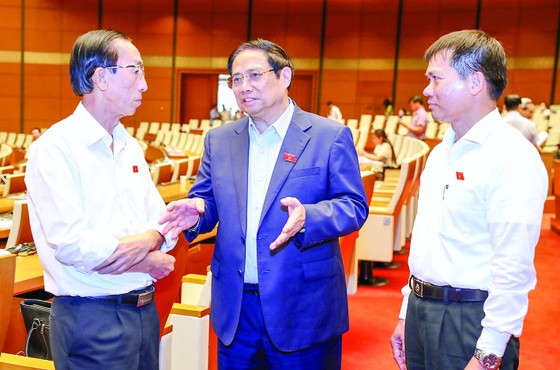 |
Prime Minister Pham Minh Chinh talks with National Assembly deputies. Photo: QUANG PHUC |
Deputy Nguyen Lan Hieu said that developing preventive medicine is the biggest challenge in the current period. The most prominent difficulties are still human resources, income, quality of medical examination and treatment, and facilities. "Increasing salaries, building beautiful facilities, and buying machinery cannot solve the root of the problem. Salaries cannot increase forever. A spacious facility without patients and modern machinery that no one knows how to use is a huge waste," said Deputy Nguyen Lan Hieu. To prevent grassroots health care from "shrinking", Deputy Nguyen Lan Hieu proposed testing a new model: considering commune and ward health stations as clinics of the district health center; assigning more authority and responsibility to the heads of health stations, and encouraging them to develop their strengths.
Delegate Pham Van Hoa (Dong Thap) and many other Delegates proposed a roadmap to increase health insurance premiums, expand the list of medical examination and treatment services, the list of medicines and medical supplies at the grassroots level paid for by the health insurance fund to promote the role of health stations in communication work and improve community health. Delegate Tran Thi Nhi Ha (Hanoi) pointed out that the salary regime for medical staff has been applied since 2004, nearly 20 years; the allowance regime stipulated in documents has been more than 10 years. Therefore, the Delegate proposed that it is necessary to immediately implement policies for grassroots health workers.
Minister of Health DAO HONG LAN: Preparing to declare the end of the Covid-19 epidemic
In preparation for the announcement of the end of the Covid-19 pandemic, the Prime Minister is expected to chair the National Steering Committee on Covid-19 Prevention and Control to discuss related issues this weekend. The Ministry of Health has developed a plan for sustainable control and management of the Covid-19 pandemic and proposed to include the Covid-19 vaccine in the regular immunization program.
Minister of Finance HO DUC PHOC: Research on budget compensation for health insurance
Currently, health insurance only collects 4.5%, of which 1.5% is paid by employees, 3% is paid by employers. The health insurance fund is limited, while spending is almost unlimited, so it must be managed according to the budget. In the coming time, when amending the Health Insurance Law, the Ministry will pay attention to the issue of budget compensation to ensure the most convenient medical payment. The Ministry of Finance will also complete policies for medical staff and medical allowances, and career incentives.
Minister of Home Affairs PHAM THI THANH TRA: Incentive policies must be special
The Ministry of Home Affairs will coordinate with the Ministry of Health to review and advise the Government on a project to develop human resources for the health sector in the public sector by 2030 in a fundamental and specific manner; comprehensively assess the organization and apparatus, human resources for preventive medicine and grassroots health care to best perform the task of ensuring people's health. The Ministry will also coordinate with the Ministry of Health to perfect the mechanism and policies on salaries, preferential allowances, and special allowances for health workers in general and preventive medicine and grassroots health care in the roadmap for reforming salary policies in the spirit of Resolution 27 of the Central Executive Committee, ensuring the Party's viewpoint that the health sector is a special sector, so the use and treatment must also ensure special policies.
Implement policies and laws on primary health care and preventive medicine
By 2022, 100% of districts will have district health centers and district hospitals; 99.6% of communes, wards and towns will have health stations; 92.4% of commune health stations will have doctors; over 70% of villages and hamlets will have village health workers.
District-level medical staff accounts for 34.6% of the total medical staff at all levels and commune-level is 15.8%.
Many district-level hospitals have deployed about 75% of the technical list according to the level of classification, some places have deployed 100% of the technical list according to the level of classification and have also deployed some techniques of the upper level.
During the peak of the Covid-19 epidemic, the number of patients treated at district hospitals accounted for about 1/3 of the total number of patients treated nationwide.
By 2022, 63/63 provinces and cities have established disease control centers.
(Source: Report of the National Assembly's Social Committee on the results of thematic supervision of the mobilization, management and use of resources for Covid-19 prevention and control; implementation of policies and laws on grassroots health care and preventive medicine)
Source



![[Photo] Prime Minister Pham Minh Chinh and Prime Minister of the Kingdom of Thailand Paetongtarn Shinawatra attend the Vietnam-Thailand Business Forum 2025](https://vphoto.vietnam.vn/thumb/1200x675/vietnam/resource/IMAGE/2025/5/16/1cdfce54d25c48a68ae6fb9204f2171a)








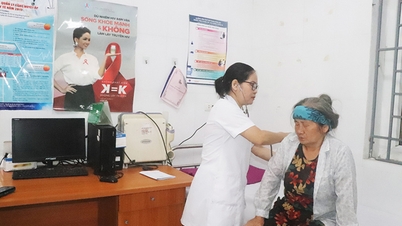

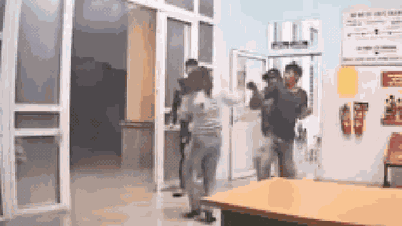



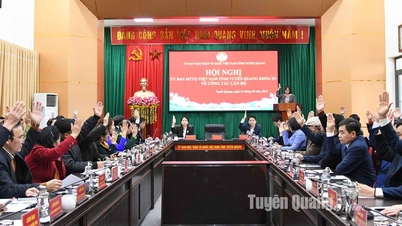



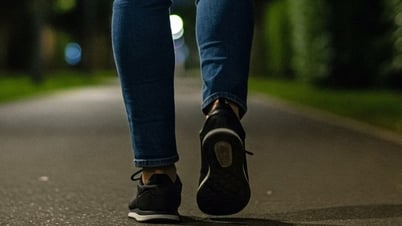




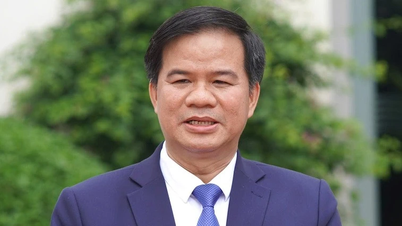




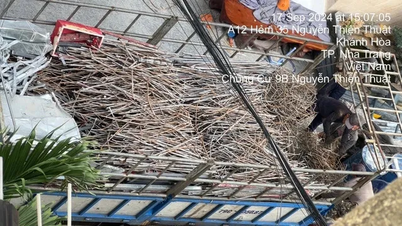
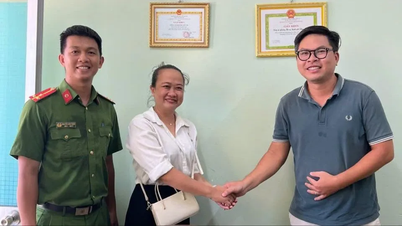


![[Photo] President Luong Cuong receives Prime Minister of the Kingdom of Thailand Paetongtarn Shinawatra](https://vphoto.vietnam.vn/thumb/1200x675/vietnam/resource/IMAGE/2025/5/16/52c73b27198a4e12bd6a903d1c218846)



























































Comment (0)